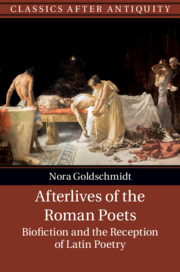Book contents
- Afterlives of the Roman Poets
- Classics after Antiquity
- Afterlives of the Roman Poets
- Copyright page
- Dedication
- Contents
- Figures
- Series Editors’ Foreword
- Acknowledgements
- Abbreviations and Note on the Text
- Introduction
- Chapter 1 Medieval Ovids
- Chapter 2 Staging the Poets: Ben Jonson’s Poetaster
- Chapter 3 Lucan and Revolution
- Chapter 4 Lucretius and Modern Subjectivity
- Chapter 5 The Death of the Author: Hermann Broch’s Der Tod des Vergil
- Post-Mortem
- Bibliography
- Index Locorum
- General Index
Chapter 1 - Medieval Ovids
Published online by Cambridge University Press: 11 November 2019
- Afterlives of the Roman Poets
- Classics after Antiquity
- Afterlives of the Roman Poets
- Copyright page
- Dedication
- Contents
- Figures
- Series Editors’ Foreword
- Acknowledgements
- Abbreviations and Note on the Text
- Introduction
- Chapter 1 Medieval Ovids
- Chapter 2 Staging the Poets: Ben Jonson’s Poetaster
- Chapter 3 Lucan and Revolution
- Chapter 4 Lucretius and Modern Subjectivity
- Chapter 5 The Death of the Author: Hermann Broch’s Der Tod des Vergil
- Post-Mortem
- Bibliography
- Index Locorum
- General Index
Summary
Chapter 1, ‘Medieval Ovids’, opens the discussion with perhaps the most prolific and the most devious author of autofiction in ancient literature: the poet Ovid. Ovid had no surviving ancient tradition of Lives, but his texts themselves provided an ideal ground for the creation of biofictional narratives. Encoding within them a life-story that deliberately teeters between fiction and reality, Ovid’s texts invited a life-centred reception that illustrates some of the essential dynamics of biofictional reading. With no ancient Life available to them, medieval writers willingly took up Ovid’s implicit invitation to produce biofictional supplements to his texts, telling and retelling stories about the poet’s imaginary lives: from the accessus or ‘introduction’ that typically prefaced texts of ancient authors, often inscribed as a paratext to the poet’s works in the manuscripts themselves, to the thirteenth-century pseudepigraphal De vetula, a 2400-line poem presented as Ovid’s autobiography from exile discovered in the poet’s recently excavated tomb. Seemingly situated on the margins of medieval culture, these experiments in life-writing show that biofictional engagement with Ovid functioned as a dynamic and creative site of reading texts and writing Lives in the period, foregrounding the case for biofiction as a mode of textual engagement in reception.
- Type
- Chapter
- Information
- Afterlives of the Roman PoetsBiofiction and the Reception of Latin Poetry, pp. 28 - 55Publisher: Cambridge University PressPrint publication year: 2019

